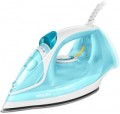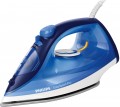Power consumption
The power consumed by the device during operation.
In general, more powerful models are considered more advanced — at least because the high power speeds up the time to heat up to operating temperature and allows you to achieve higher steam performance. On the other hand, such power significantly affects the dimensions, weight and price.
Among classic irons, power up to 1500 W corresponds to the entry level, it is mainly typical for travel models. An indicator of 1500 – 2000 W is considered average, and values of 2000 W and more are typical mainly for professional devices. In the presence of a steam generator, the power increases noticeably, and among ironing systems and presses there are models with a power of up to 6 – 7 kW.
Steam supply power
The steam supply power provided by an iron is essentially the amount of steam supplied by the device per minute. In most modern irons, the intensity of steaming can be adjusted, so this item usually indicates the maximum power value.
The more steam the iron supplies, the more intense the effect on the fabric, the more dense and rigid materials can be effectively smoothed out without resorting to a steam boost (see below). On the other hand, high performance significantly affects the price, dimensions and weight of the iron. Accordingly, it is worth choosing according to this indicator taking into account the planned method of application — especially since the full power of steam is far from always required, and in special cases the same steam boost can be used.
In travel and simple household irons, the productivity is about 15 – 30 g/min. More than 30 g/min corresponds to enhanced steaming, and the most advanced devices, mainly for professional use, are capable of producing 60 g/min or more (the so-called “turbo mode”).
Steam boost power
The steam power supplied by the iron in boost mode.
The steam power is the amount of steam the iron produces per minute. See above for more information on the general meaning of this parameter. And the steam boost mode is a mode of enhanced steaming, when the iron practically “shoots” with a boost of steam; "shot" is usually made by pressing a special button. Steam boost allows you to achieve an intense effect that is not available with conventional steaming; such an impact can be useful, for example, to smooth out heavily rumpled fabrics that would be difficult to deal with in other ways.
A steam boost of 100 g/min or more is said to be sufficient to handle most tough and "unruly" materials. And
models with a powerful steam boost from 200 g/min will definitely not leave even the most dense fabric rumpled. However, there are models with more modest indicators — they are quite suitable for those who need an iron for ordinary household ironing. Moreover, high power, usually, affects the cost. Do not forget about irons with a steam generator, where the performance values are higher, since the purpose of the iron is slightly different.
Water tank volume
The volume of the water tank installed in the iron.
The water from this container is used to generate steam when steaming fabrics. In modern models of irons, the tanks are made of transparent materials and are provided with a lid at the opening through which water is poured. As for capacity, a large volume, on the one hand, allows you to work longer without refilling, on the other hand, it significantly makes the entire device heavier. Therefore, in classic models, where the tank is located on the iron itself, the capacity is usually small — about 80 ml for travel and 300 ml for household models. But there are also
irons with a large water tank, in which the volume can reach 500 ml. But for advanced steam generators and ironing systems (see "Type"), the tank is made separately, and in such cases its volume can be 1 L, and for
models with a large tank, figures of more than 1.5 L are typical.
Cable length
The length of the cable for connecting to the mains provided in the iron.
Manufacturers select the length of the cable, taking into account the general specialization of the iron and the characteristics of its application — so that the wire is enough for most cases and at the same time it is not too long and bulky. Therefore, in most cases, this parameter can be ignored; exceptions are only some specific situations. For example, if you choose a travel iron and compactness is a key criterion, you should choose a
shorter wire. A
long cable, in turn, will come in handy at a great distance from sockets and the absence of extension cords.
For clarity, we note that for household irons, the average cable length is 1.5 m.

